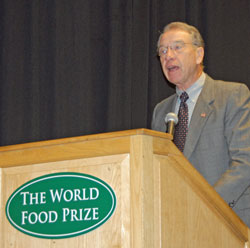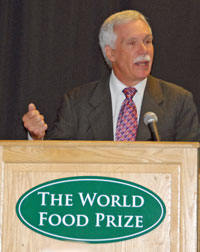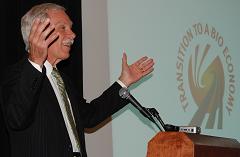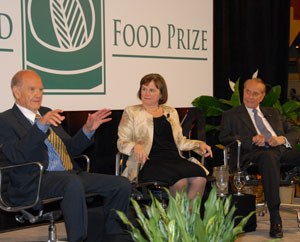One of the problems ethanol and biodiesel have had is how to get their product from areas of production to areas of consumption. Pipelines help conventional, petroleum-based fuels, so it’s only natural that biofuels would need to adopt similar technology.
 Kinder Morgan Energy Partners LP has announced successful testing of ethanol through its 16-inch, 195-mile Central Florida Pipeline (CFP) system between Tampa and Orlando, Florida and the beginning of testing of a biodiesel pipeline in the Southeast U.S. This story in the Oil & Gas Journal has details:
Kinder Morgan Energy Partners LP has announced successful testing of ethanol through its 16-inch, 195-mile Central Florida Pipeline (CFP) system between Tampa and Orlando, Florida and the beginning of testing of a biodiesel pipeline in the Southeast U.S. This story in the Oil & Gas Journal has details:
It is finalizing mechanical modifications to the pipeline to offer ethanol transportation services to its customers by mid-November and is evaluating batched ethanol transport possibilities for other parts of its pipeline system.
The company says the short length of the pipeline will limit transmix.
CFP has segregated storage for the ethanol at the Orlando end of the pipeline. Total storage capacity is 546,000 bbl, contained in 28 tanks of 8,190 gal. – 80,000 bbl each. Land is available for expansion.
Kinder Morgan has completed more than $60 million in ethanol projects including modifications to tanks, truck racks, and related infrastructure for new or expanded ethanol service in the Southeast US and Pacific Northwest and has approved an additional $27 million for ethanol projects in the Southeast.
The company is also undertaking tests to assess commercial transportation of biodiesel through its pipelines, running blended B-5 biodiesel through a segment of its Plantation Pipe Line system between Collins, Miss. and Spartanburg, SC. The company expects test results by the end of October. It also is evaluating transporting biodiesel on its Portland-Eugene, Ore. line to support Oregon’s forthcoming biodiesel mandate.


 He believes that increasing the use and acceptance of biotech crops is vital. “We’re entering a new generation in agriculture,” Grassley said. “This generation not only encompasses feeding the world, but also fueling vehicles and eventually getting in to treating patients through pharmaceuticals in crops. This offers opportunities for biotechnology growth throughout the world that will continue to feed populations and provide new prospects for our rural communities.”
He believes that increasing the use and acceptance of biotech crops is vital. “We’re entering a new generation in agriculture,” Grassley said. “This generation not only encompasses feeding the world, but also fueling vehicles and eventually getting in to treating patients through pharmaceuticals in crops. This offers opportunities for biotechnology growth throughout the world that will continue to feed populations and provide new prospects for our rural communities.” The answer to feeding a growing world population lies with building on the success of the American farmer, according to Agriculture Secretary Ed Schafer, who addressed the World Food Prize breakfast Friday morning in Des Moines.
The answer to feeding a growing world population lies with building on the success of the American farmer, according to Agriculture Secretary Ed Schafer, who addressed the World Food Prize breakfast Friday morning in Des Moines. The
The  As promised, I’ve got some more material for you from Secretary of Agriculture Ed Schafer, who addressed attendees of the Farm Foundation’s Transition to a Bioeconomy: Environmental and Rural Impacts Conference in St. Louis, Mo.
As promised, I’ve got some more material for you from Secretary of Agriculture Ed Schafer, who addressed attendees of the Farm Foundation’s Transition to a Bioeconomy: Environmental and Rural Impacts Conference in St. Louis, Mo. The president of the World Bank made an appearance at the
The president of the World Bank made an appearance at the  The ability of the world to grow enough agricultural crops to produce both food and fuel was a topic of discussion at the World Food Prize symposium in Des Moines on Thursday, which was also World Food Day.
The ability of the world to grow enough agricultural crops to produce both food and fuel was a topic of discussion at the World Food Prize symposium in Des Moines on Thursday, which was also World Food Day. Making soybeans into biodiesel is no food versus fuel competition – rather it is food AND fuel.
Making soybeans into biodiesel is no food versus fuel competition – rather it is food AND fuel.



 The recent credit crisis in the country was certainly a hot topic of conversation at today’s Farm Foundation Transition to a Bioeconomy: Environmental and Rural Development Impacts Conference here in St. Louis, Mo.
The recent credit crisis in the country was certainly a hot topic of conversation at today’s Farm Foundation Transition to a Bioeconomy: Environmental and Rural Development Impacts Conference here in St. Louis, Mo.